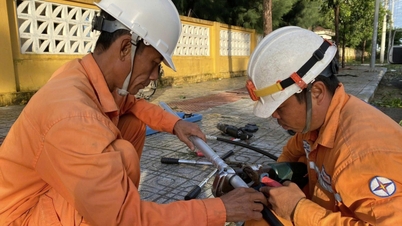On the morning of November 4, the Government submitted to the National Assembly a draft Law on Personal Income Tax (amended), which proposed reducing the number of tax brackets from 7 to 5, but the highest tax rate would remain at 35%. The lowest tax rate of 5% applies to incomes up to 10 million VND/month, while the highest rate of 35% applies to those with incomes over 100 million VND/month, instead of the current threshold of 80 million VND.
The draft also adjusts the family deduction level in a significant direction. Specifically, the deduction level for the taxpayer himself increases from 11 million to 15.5 million VND/month, and for dependents increases from 4.4 to 6.2 million VND/month. With this calculation, a single person with an income of 17 million VND/month (after deducting compulsory insurance) will not have to pay tax. A person with one dependent and an income of 24 million VND/month, or two dependents with an income of 31 million VND/month will not have to pay tax.
Adjust to reality
One of the topics discussed was the tax policy for women who work as freelancers, online sellers or caregivers. According to experts, women account for a large proportion of informal economic activities and e-commerce, but face many difficulties in declaring and paying taxes due to a lack of specific guidance and appropriate tools.

Overview of the meeting. Photo: Quochoi.vn
The draft Law's addition of clearer regulations on income from personal business, including the provision of digital products and services, is considered a necessary step to ensure tax fairness between the traditional sector and the digital economy.
Notably, the tax rate on income from digital content, entertainment, electronic games, etc. has been adjusted from 2% to 5%, reflecting the trend of expanding revenue sources in the context of rapid technology development. However, experts say that it is necessary to support freelance workers, especially women, in declaring and fulfilling tax obligations through digital platforms or reputable tax agents.
The burden of care needs to be recognized and appropriate reduction mechanisms put in place. Many opinions at the discussion session said that women still bear the majority of responsibility for caring for young children, the elderly or people with disabilities, but this is not clearly recorded in the tax system.
Therefore, the amended Law should consider adding a special deduction for those who have to undertake caregiving obligations, to ensure gender equity in tax policy.
According to Ms. Do Hai, a tax and accounting expert, the specific nature of Personal Income Tax does not apply to low-income individuals, so this revenue will be fair to all subjects, contributing to reducing the gap between social classes.
"In my personal opinion, personal income tax needs to be carefully calculated before applying to ensure tax fairness. In addition, the authorities also need to pay attention and research more preferential policies for women when calculating personal income tax from salaries and wages to have more support for this group of people because of their special responsibilities to family and society," Ms. Hai added.
Lawyer Nguyen Dai Phong (Ho Chi Minh City Bar Association) commented that, with the characteristics of many women doing online business today, they are often those who do not have stable jobs, have to do business to support their families, and have to take care of their children. According to the personal income tax form, the lowest tax rate is 5%, equivalent to 500,000 VND/month for an income of 10 million/month (120 million VND/year). Although this is a low tax rate compared to the general level of countries, it is necessary to recognize the reality that an income of 10 million VND/month is currently not enough to cover family living expenses, especially for families working in the cities.
Therefore, it is necessary to consider adding a preferential tax rate for women who do online business at home, to respond to the difficult general economic situation, and at the same time support childcare.
Need to apply soon, transparently and fairly
If approved by the National Assembly at the end of this session, the amended Law on Personal Income Tax is expected to take effect from July 1, 2026. The provisions on individual entrepreneurs and the progressive tax schedule, as well as the new family deduction, may be applied from January 1, 2026 to harmonize policies. However, changes to the tax schedule need to be carefully evaluated to avoid creating new burdens for the middle- and low-income groups, while ensuring the principle of fairness between income types.
The amendment to the Personal Income Tax Law this time is not only to update tax rates and tax brackets but also an opportunity to redesign a more equitable, modern and inclusive tax policy. In particular, recognizing and supporting flexible income groups – especially women in the digital economy – will be an important step towards a fair, humane and sustainable tax system.

Women who sell online are the ones most affected by the Law on Personal Income Tax (amended) if passed.
Ms. Do Thi Thanh Phuong ( Hanoi ) said that her current monthly income is about 18 million VND. After deducting her family circumstances, she is still subject to personal income tax.
From a business perspective, Ms. Nguyen Thanh Tam, director of a business in Hanoi, said that the information provided in the draft Law on Personal Income Tax (amended) is reasonable and consistent with reality. Vietnam's economy has grown rapidly in recent years, leading to high incomes for many workers. However, the cost of living, studying, and health care has also increased, causing many families with average and low incomes to not be able to pay personal income tax. Therefore, the Government's decision to raise the personal income tax threshold as well as adjust the family deduction level is completely appropriate, creating more motivation for social development.
"A clear tax payment mechanism is to clearly identify who is the taxpayer and how much to pay in accordance with reality. According to the general regulations of countries in the EU, the US, New Zealand... on online business, these countries stipulate that online business owners must register their business on e-commerce platforms or through online sales websites. And website owners or e-commerce platform owners must register their business. Vietnam can apply the above general regulations to online business, and at the same time, the law needs to clearly stipulate that online business needs to be approved by the e-commerce platform or website owner," added Lawyer Nguyen Dai Phong.
In the context of a rapidly developing digital economy, more and more women are participating in online business, from selling via social networks to building personal brands. This is a positive trend, demonstrating the dynamic, creative and economically independent spirit of Vietnamese women. However, the rapid development of this form also requires the adjustment and improvement of the Personal Income Tax Law to ensure fairness and encourage sustainable development of this special group.
Master Nguyen Xuan Thong, Deputy General Secretary of the Hanoi Association of Small and Medium Enterprises, said that first of all, the law needs to have clearer and more flexible regulations in determining taxable income for online business activities. Most women who sell online start small businesses without proper accounting books, so applying a fixed tax rate or a common income bracket can easily cause inequality compared to large-scale businesses. Policies need to be based on actual revenue, encourage honest declarations, and provide technical support and tax advice to small businesses, especially women in rural and remote areas.
In addition, it is necessary to develop appropriate incentive mechanisms, such as tax deductions for women with young children, single women or female-owned businesses, to encourage them to maintain legal economic activities. The combination of tax fairness and humane policies not only helps increase budget revenue, but also promotes gender equality in the digital business sector, creating a favorable environment for women to develop their capacity, improve their status and contribute more positively to the national economy.
Source: https://phunuvietnam.vn/du-thao-luat-thue-thu-nhap-ca-nhan-can-chu-y-toi-toi-doi-tuong-thu-nhap-trung-binh-thap-20251106145136908.htm




![[Photo] Da Nang: Hundreds of people join hands to clean up a vital tourist route after storm No. 13](https://vphoto.vietnam.vn/thumb/1200x675/vietnam/resource/IMAGE/2025/11/07/1762491638903_image-3-1353-jpg.webp)











































































































Comment (0)